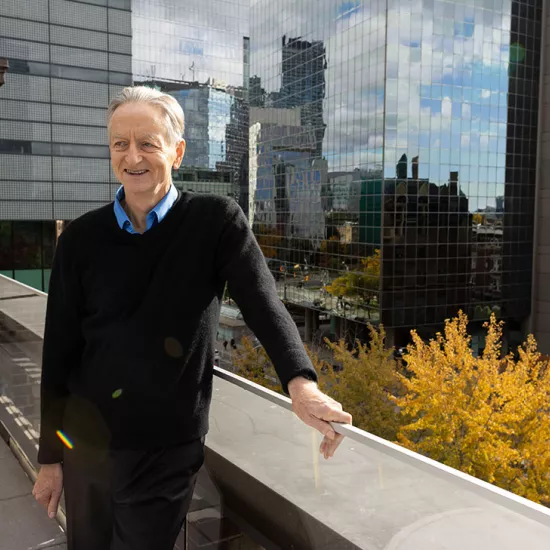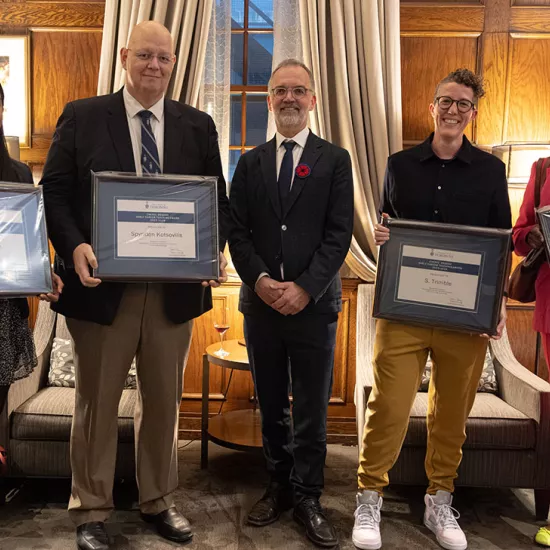A Path Out of Poverty: Caring teachers inspired UTM prof to seek better opportunities

As a sociologist, Jerry Flores wonders incessantly about “turning points” – those moments, for example, when a marginalized young person manages to break free from systemic oppression and poverty.
Flores has known such moments himself. As a youth, he lived in a low-income Latino neighbourhood in suburban Los Angeles, where he did poorly in school. Now, he’s an assistant professor of sociology at the University of Toronto Mississauga, teaching others how the criminal justice system regularly ensnares poor, racialized teenagers and adults in a cycle of crime, surveillance and punishment that many find impossible to escape.
“Growing up, I had the feeling I just wasn’t wanted at school,” he remembers. “I started skipping class, doing all kinds of other stuff I shouldn’t have been doing. Eventually, I failed every single class in my first two years of high school.”
And yet, education, and caring educators, would ultimately prove to be Flores’s ticket out. The son of an autobody worker and hotel cleaner who had immigrated to escape Mexico’s collapsing economy in 1982, Flores initially found himself stuck in a crowded, under-resourced, very segregated public school where almost every student was working class and Latino or Black. The neighbourhood was heavily patrolled by police who would pull him over at gunpoint, “often for not doing much of anything.” He saw family members arrested and jailed. Unsurprisingly, he lost interest in school and dropped out.
Then came his first turning point. Flores registered in a supportive alternative school, the exact opposite of the one he had left. For the first time, teachers encouraged him to think about enrolling in university; within several years, he had graduated, earned three degrees, and was writing his first book.
Initially, he wanted to write about juvenile detention. He found the perfect subject in “El Valle,” a correctional institute for youth not far from Los Angeles, and focused his work on studying girls in the system. But while volunteering there as part of his research, he noticed that a large alternative school was connected to the prison.
It was far removed from the nurturing school that had changed his life. He says, “I had never seen a detention centre and a school that were so closely tied” – not only physically, but in other systemic ways as well.
A teacher explained that the “Legacy” Community School provided girls with “wraparound services,” including educational and therapeutic supports, upon leaving the detention centre.
On the surface, this seemed like a good idea, but in practice it was altogether different. Flores observed that girls were obsessively monitored at the school, subject to at-will drug testing and the constant presence of police. Infractions of any type would propel them back into detention. He developed his own term for it: “wraparound incarceration.”
The eventual book that arose from his research – entitled Caught Up: Girls, Surveillance, and Wraparound Incarceration – is a powerful indictment of a system in crisis.
Flores found that rule breaking at the school was almost inevitable, since many of the girls had run away from home to escape physically and sexually abusive environments. Runaways, writes Flores, “have to ‘hustle’ to take care of themselves…girls (and boys) may participate in survival sex, shoplift food and clothing, or work in other illicit trades to stay alive.” The choice these teenagers often face is to break the law or die.
His research also revealed that “Legacy” was not alone, being one of 283 such schools for at-risk youth in California. His interviews with the girls reveal, in heartbreaking fashion, the extent to which they see education as just another form of jail.
“School is supposed to help you feel self-fulfilled and empowered,” Flores says. “It’s supposed to make you feel good about yourself. But these young people have wholeheartedly associated school with punishment and surveillance. And these supports that are intended to help them are actually making things worse.”

Girls are not the only group trapped by this system, but Flores chose to focus on them because they had been understudied and experience unique difficulties, such as assault and exploitation.
He had taken women’s studies as an added expertise in his PhD and become painfully conscious of how “toxic masculinity” had affected his own life and that of other boys and men. At U of T Mississauga, he is developing a course on the subject. Yet his research at “Legacy” – which was highly immersive, involving a long period of intense observation and study – proved challenging.
“Immediately, these young women started peppering me with questions like, ‘Are you a probation officer? Are you police? What are you doing here?’ I always did my best to answer their questions as truthfully as I could,” he says. “I was aware that I looked like a lot of the men who had victimized them.”
He also realized that traditional ethnographic research methods have often been unfair; he wanted to do things differently. “The mistake a lot of folks make when they do research with at-risk groups is they show up, take what they want and leave, which is a very colonial model,” he says.
When observing the girls of “Legacy” or any other group, Flores believes in the principle of repaying his subjects in acts of kindness and compassion. In the Legacy case that meant spending a long time volunteering, playing sports, helping with homework – even organizing a field trip to the University of California, Santa Barbara, so the girls could envision themselves making the transition to higher education. “They got to eat at the dining hall for free,” he remembers. “These poor kids were always hungry, and some of them told me it was the first time they felt full.”
It was during this period of research that the young academic grew concerned about what he saw as a darkening tone in American politics. “As Donald Trump’s campaign started picking up steam, there was an increase in hate crimes in Los Angeles and elsewhere. It was like bigots were starting to feel emboldened,” he recalls. On election night in 2016, Flores was living in Tacoma, Washington with his wife and son.
Trump’s election frightened him. “I said, ‘Is this really happening right now?’ I was in shock.” Having received three job offers – one from Rutgers in New Jersey, one from the University of California, Riverside, and one from U of T Mississauga – Flores chose to move to Canada. “I knew that moving to Toronto was going to be the best choice for all of us; I felt we had to get out before we wouldn’t be able to go,” he says. “I sometimes have ‘survivor’s guilt’ because I have family who still live in the U.S. And every time I turn on the news, there it is; it’s been so much worse than I expected. It cuts you to the core when you see children who look like you being torn away from their parents and put into cages.” Asked before the 2020 election whether a Trump defeat would send him back home, Flores says no. “I feel that I fit in here, that my family is safe. Canada’s not perfect, but it’s perfect for me.”
Flores has become interested in Canadian problems that, in many ways, mirror those he witnessed in the United States. One is that of missing and murdered Indigenous women.
His next book will centre around this community, focusing on why Indigenous women leave their homes, and on their interactions with the criminal justice system. “Though with ethnography,” he says, “one of the exciting parts is that you don’t really know what the book is until you get there.” True to form, he’s partnered with local Indigenous organizations to immerse himself in the issues – taking time to volunteer variously as a driver, a runner of errands, a grant writer, and an assistant on a documentary film shoot. “I feel connected to the community, since my grandparents were Indigenous people from Mexico. I see a lot of parallels there.”
Flores is optimistic about the power of academia to help marginalized youth experience the same turning points that he has. In addition to his other duties, this means regularly engaging with the media as a commentator and op-ed writer.
“The main reason I became an academic is to participate in social justice,” he says. “Right now I have all this power and privilege, and I can’t just sit idly by knowing that people are suffering. I have to try and do something.”
This story first appeared in the Winter 2020 issue of University of Toronto Magazine
Read more:



